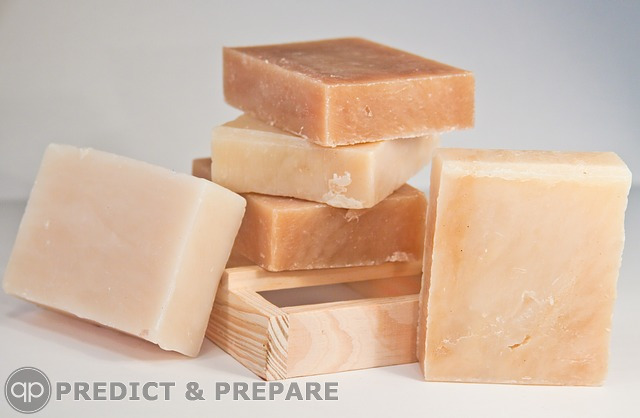Have you noticed that many store brands use words like cleanser and bar rather than the word “soap”? That’s because most of the “soap” on the market nowadays isn’t really soap at all, just a concoction of detergents and chemicals. In fact the glycerine which is created during saponification (soap making process) is actually extracted and replaced with synthetic agents. The glycerine is used to make higher priced lotions and moisturizers. Many commercial soaps/cleansers contain ingredients like soybean and corn oil from GMO crops. There is a lot of controversy surrounding GMO products and their health effects, in fact they are banned in some countries. Triclosan is another common ingredient which has been linked to cancer. Store bought soap quite often contains sodium lauryl sulfate which creates lather but also strips your skin of its natural oils, leaving it feeling dry and tight. Whereas many homemade soap recipes contain all natural ingredients like essential oils, as well as vegetable oils and butters which are rich in vitamins, nutrients and antioxidants.
If the health reasons alone aren’t enough, soap making is a skill that can also be beneficial to those looking to be more self reliant and/or prepping for a disaster situation. Soap is a basic necessity and may be harder to obtain if the SHTF, so it can be bartered, etc.
Soap making can also be a profitable venture. There is definitely a market for natural organic homemade soap and consumers are willing to pay a premium. There are tons of recipes and scents, your soap can be as basic or fancy as you like, the possibilities are endless . Rather than using artificial colour, soap makers use natural ingredients for colour. Examples are cocoa powder (brown), cayenne pepper (pink), paprika (peach) and cinnamon (beige). Organic herbs and spices can be used for making soap specific to certain skin types. For instance tea tree is great for acne, while oatmeal, cornmeal and poppy seeds are excellent exfoliants.
With just a few supplies, soap making is fairly easy, there are two methods, cold process and hot process. Both ways do require lye (sodium hydroxide) which is a caustic substance. However, by taking the necessary precautions (gloves, etc) it can be handled safely. The caustic properties of the lye are removed during saponification so the end product is completely safe. The cold process takes the most time as it needs to sit for 2-6 weeks, while hot process soap is ready to use. Although making soap via the cold process is more time consuming, it is considered the best method for the highest quality soap. Even if you don’t have the time or desire to learn how to make your own soap, you can reap the benefits by purchasing from someone who does.
Whether it’s for the health benefits, the potential for income/barter, or just the fun of it, soap making can be very rewarding.
